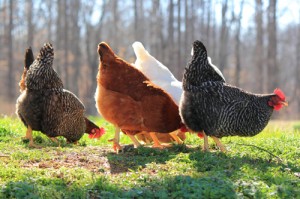 Reducing or limiting stress is one of the best things you can do to keep your flock healthy and productive. Similar to how stress affects humans, in poultry it can lead to many problems including: reduced egg production, poor rate of growth and development, and greater susceptibility to disease.
Reducing or limiting stress is one of the best things you can do to keep your flock healthy and productive. Similar to how stress affects humans, in poultry it can lead to many problems including: reduced egg production, poor rate of growth and development, and greater susceptibility to disease.
According to Gail Damerow, author of The Chicken Health Handbook, chickens are always undergoing some level of stress. Our task shouldn’t be to totally eliminate stress but instead limit and reduce it.
Lots of things can cause stress to your flock, most of which are easy to correct or prevent. Some of the obvious causes of stress include:
- Water problems. Running out of water can cause unnecessary stress. Poor quality water can also cause stress. To reduce stress, give them a continual supply of clean, fresh water, and clean their watering equipment regularly. For more information, see our article on the importance of water for chickens.
- Inadequate nutrition. Chicken feeds are designed for specific applications and ages. Feeding the wrong type of feed can lead to inadequate nutrition, as well as not having enough feed or letting feed spoil. For example, newly hatched chicks should receive a chick starter that supplies adequate levels of protein, not a lower protein ration intended for mature birds, such as layer ration.
- Excessive or Rough Handling. Handling chickens stresses them to some degree, particularly rough handling. Children that have not been properly taught how to handle the birds can cause a lot of stress. On the other hand, proper handling of your birds can reduce stress overall. If you rarely handle your chickens, they will not be use to human contact so when you have to handle them (ex. to check for mites), it will stress them more than necessary. The solution is to handle them gently and frequently enough that they get used to it, but in moderation. Just spending some time in the coop or pen with them for a few minutes daily will help. Picking up a hen or rooster and holding it for awhile before gently setting it down will help them learn that you aren’t going to harm it. With regular handling, they will get tamer (some breeds more than others) and be less stressed when you do have to handle them.
- Fear of dogs or predators. If your chickens are being threatened by predators, or if dogs are allowed to run around the coop, they may frighten the chickens, which causes stress. You may want to consider putting up some type of perimeter fencing that can keep animals like these away from the coop.
- Overcrowding. Having too many chickens in a too small of a space increases stress, exacerbates tendencies toward pecking one another, makes good hygiene more difficult and can increase the risk of diseases and parasites. Make sure your chickens have plenty of space.
- Parasites and disease. Diseases as well as internal parasites, such as worms, and external parasites, such as mites, causes stress in chickens which weakens their immune systems making them more susceptible to disease.
- Extremes of Temperature. Heat stress is one of the most commonly discussed types of stress for chickens as does excessive cold. Chickens are typically much more insulated than we are, so what feels cold to us is not necessarily cold for them.
One of the best ways to recognize sources of stress and other problems is to spend time with your chickens and observe their behavior and their living conditions. You’ll be able to see quickly when living conditions aren’t clean enough and allow you to smell the harmful ammonia build-up that can result from inadequate ventilation.
Beyond that, chickens’ behavior will change when they experience higher levels of stress. If you spend time with them and watch them enough to recognize their normal behavior, then you’ll be able to more easily notice when their behavior has begun to change as a result of stress. You can then quickly determine the cause and make changes to fix the problem and reduce their stress levels resulting in a happier, healthier and more productive flock.


